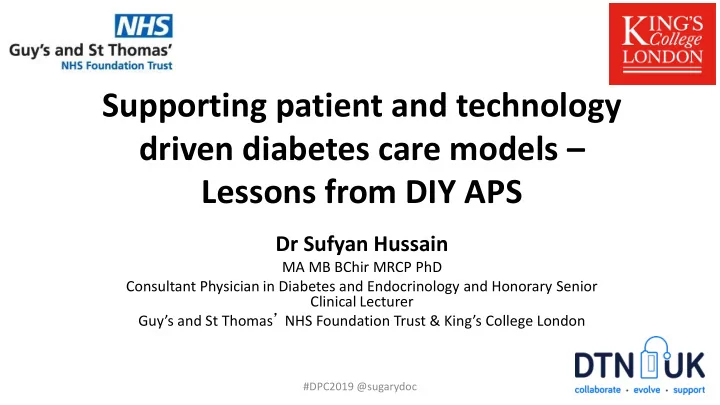

Supporting patient and technology driven diabetes care models – Lessons from DIY APS Dr Sufyan Hussain MA MB BChir MRCP PhD Consultant Physician in Diabetes and Endocrinology and Honorary Senior Clinical Lecturer Guy ’ s and St Thomas ’ NHS Foundation Trust & King’s College London #DPC2019 @sugarydoc
Disclosures • Non-promotional educational talks and educational advisory roles fees from – Roche, Medtronic, Dexcom, Novo Nordisk & MSD • The slides and views expressed are my own #DPC2019 @sugarydoc
Technology driven and patient led care models? • Serious challenges for health care systems – solutions? #DPC2019 @sugarydoc
Why DIY APS? Figure taken with permission from Lewis D, Automated Insulin Delivery, ISBN 9781797763699, https://www.artificialpancreasbook. com Dana Lewis 2019 #DPC2019 @sugarydoc
Why DIY APS? Figure adapted with permission from Lewis D, Automated Insulin Delivery, ISBN 9781797763699, https://www.artificialpancreasbook. com Dana Lewis 2019 and taken from Marshall, Holloway, Korer, Woodman, Brackenridge, Hussain, Diabetes Ther. 2019 #DPC2019 @sugarydoc
Why DIY APS? • Evidence? – 24 publications relating to DIY APS or related aspects – Mostly data from self-reported outcomes – Data from these studies highlight that compared to conventional methods, DIY APS can offer : • • Increased time in range Less reliance on accuracy of • Reduced glucose variability carbohydrate counting • • Reduced episodes of hypoglycaemia Improved overnight control • Reduced mental burden Jennings, Hussain, JDST 2019 (under review) #DPC2019 @sugarydoc
Why DIY APS? - Clinical experience • Constraints in commercially approved systems Aleppo, Webb, Endocr Pract 2018 • Experience of DIY APS in clinical situations including: – Intensive or prolonged exercise – Pregnancy – Young infants – Steroid treatment – Surgery – Fasting Marshall, Holloway, Korer, Woodman, Brackenridge, Hussain, Diabetes Ther 2019 Jennings, Hussain JDST (under review) #DPC2019 @sugarydoc
Why DIY APS? - Clinical experience Tauschmann et al. Lancet 2018 Slide and data courtesy of Dr. Emma Wilmot, Derby #DPC2019 @sugarydoc
Ethical legal and regulatory constraints Consensus from various statements produced on DIY technology use for HCPs #DPC2019 @sugarydoc Jennings, Hussain JDST (under review)
Implications for healthcare systems? • HCP Training and awareness “Read the docs” – For Clinicians • Implications for HCPs – HCP role – facilitating and supporting – Increased initial training with less need for ongoing patient-HCP interaction – Responsive DIY Community support – More time to focus on other concerns during clinic visits #DPC2019 @sugarydoc
Systemic changes needed • Current paradigm can not support patient and technology driven models – Research and research models – Reporting mechanisms & data registries – Regulatory processes ABCD DIY Audit • Other big issues: • Simplification and wider applicability? • Access to technologies for type 1 diabetes #DPC2019 @sugarydoc
Automated diabetes – the future? The present: Hybrid closed loop DIY artificial pancreas systems are here >1569 users world wide (OpenAPS Outcomes) #DPC2019 @sugarydoc
Acknowledgements • Diabetes and Endocrinology team at Guy’s and St Thomas • Colleagues at ABCD DTN – Emma Wilmot, Peter Jennings • DIY community and users – Dana Lewis, Alasdair McLay #DPC2019 @sugarydoc
Recommend
More recommend